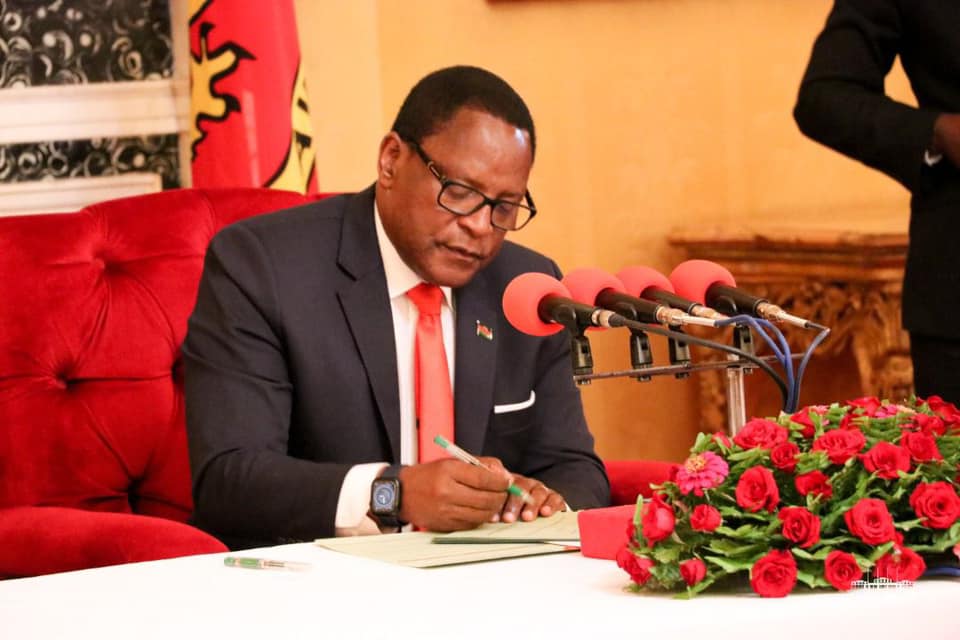Chakwera’s unfulfilled pledges under spotlight again
Almost halfway through his term, President Lazarus Chakwera has come under criticism for failing to fulfil commitments he made after winning the June 23 2022 court-sanctioned fresh presidential election.
Political analysts and commentators have said Chakwera’s dilly-dallying on the promises does not reflect well on his administration, but government spokesperson Gospel Kazako argued that some laws need to be changed to allow the President fulfil his pledges.

On September 10 2020, in Parliament, Chakwera vowed to reduce his power by, among other things, stop making too many appointments in State institutions and some decisions within the Executive.
He also said he will stop being the Chancellor of public universities as well as bring to an end unnecessary police presence when he was travelling.
The President reiterated the commitments in a national address on September 6 2020.
But two years and three months later, Chakwera is yet to fulfil some of the pledges, causing political analysts to doubt his political will.
Catholic Commission for Justice and Peace (CCJP) national coordinator Boniface Chibwana said in an interview on Friday that the delays would be “deemed as a good lie to attain the position”.
He said if the President had political will he would have fulfilled some of the pledges.
Chibwana said: “It’s easy to say something when one is outside the State House and when one occupies the office everything changes.
“Not only has the President been reluctant to reduce his appointment powers, but he has enforced and protected legislations that put the presidency in an overly enhanced autonomy.”
He further said it is clear that the President is not engaging any gear to keep his promises.
Politician-cum-commentator Humphrey Mvula urged Chakwera to demonstrate political will to fulfil his commitments.
He said: “The President should take deliberate steps to amend laws that give him too much power.”
To achieve this, Mvula said a Special Law Commission should be put in place to review the President’s powers and trim them where necessary.
But Minister of Information and Digitisation Gospel Kazako, who is also government spokesperson, agreed with Mvula on the need to change some laws to enable the President to fulfill his pledges.
In view of this development, he said no one should say Chakwera is unwilling to fulfil his pledges.
But governance commentator Mavuto Bamusi disagreed with the minister, arguing Chakwera is bad at fulfilling promises.
“These are political lies which have potentially contributed to his fast eroding credibility,” he said.
Bamusi warned that unfulfilled commitments are likely to lead to voter apathy in the 2025 Tripartite Elections.
During the State House Quarterly Briefing on July 5 2022 at Kamuzu Palace in Lilongwe, presidential spokesperson Anthony Kasunda told the press that Chakwera is focused on changing archaic laws not reducing his powers.
He said the President would, therefore, at an appropriate time, state his position on the matter.
But when asked about the progress the President has made to amend laws to fulfil his commitments, Kasunda on Wednesday declined to comment, saying he was not in office.
Centre for Social Accountability and Transparency executive director Willy Kambwandira said Chakwera’s failure his promises is an accountability perspective.
“It is up to Malawians to judge him. The challenge is that as a country we do not have a framework for holding politicians accountable for their campaign promises,” he said.
During his appearance in Parliament in September 2020, Chakwera told the House that reduction of presidential powers will be legislative, administrative and ceremonial.
The President said: “The administrative power due for review is the power to control the cash flow of Parliament. It is my view that as it is with the Judiciary, once a budget is passed, Parliament’s vote should be ring-fenced and put in accounts controlled by the Legislature itself, subject to its own audits.”
In a September 2020 radio address, Chakwera said in his jurisdiction, there are certain positions that are reserved for the President such as Head of State, Head of Government, and Commander-in-Chief of the Armed Forces.
These, he said, would not be reviewed.





